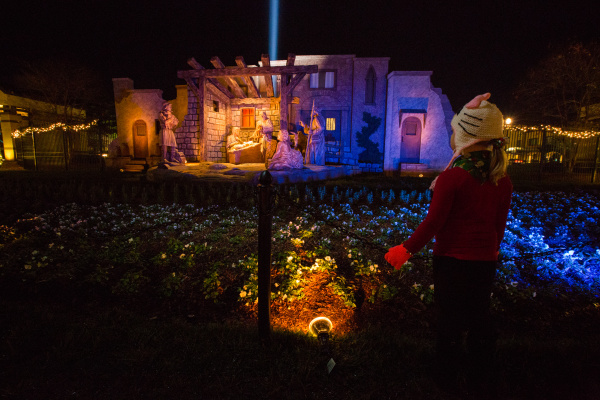Trees get more attention during Christmas than at any other time of the year. I put up a live tree because it speaks to me of new life brought into the home near the close of one year and the start of a fresh one. And I like what to me is its beckoning fragrance.
Appropriately the tree is an evergreen. It speaks to me of everlasting life and with it the ongoing, undiminishing life of a believer. Yet the tree has to be watered. Jesus told the Samaritan woman of John 4 that He could put within her thirsty soul “a well of water springing up into everlasting life.” She would never thirst again. “Living water,” He called it.
I wonder, could it be winter in your life right now? Are your branches drooping a bit? That living water once put there by the Lord will do what it is there to do if you will let it. It’s the vital life of a Christian.
We are all perfectly imperfect.
Every year a week or two after Thanksgiving I first pray and then go looking for a tree that will suit the place I have for it and that will be one my family will enjoy decorating. I want an eight-footer, bulging and bushy and balanced—that is, on three sides. It needs a flat side. How so? The tree has to fit in a corner. Whoever decorates it has to get behind it to string the lights and whatever. One might ask, why worry about the back quarter? No one will see it. Well, God will, and He’s important to our celebration.
This year that feature of our tree—that it needs to be flat-sided—became a kind of parable to me. Each of us who knows the Lord has a flat side about him which can depress his thoughts and even his life if he will let it. No one has perfect proportions and filled out dimensions. We can feel passed over in features which matter to us that God has given to others. It may be we have botched our lives in a way others haven’t. Possibly we’ve forgotten the character of our God, what He showed of Himself to His prophet Ezekiel, “I the Lord build the ruined places, and plant that that was desolate” (36:36). God Himself can “gather up the fragments that remain” of a life “that nothing be lost” (John 6:12).
Comparing ourselves with others is not healthy.
My father once said to me that my twin brother Don was a million miles ahead of me in some things and I was a million miles ahead of him in others. That is true of every one of us. We can dwell on what we have that others lack or on what we lack that others have and make ourselves useless to God and to ourselves. Both pride and despair are deadly to the soul. Paul told the Corinthians that their “measuring themselves by themselves and comparing themselves among themselves [were] not wise” (2 Cor. 10:12). “A man can receive nothing, except it be given him from heaven,” John the Baptist told his disciples (John 3:27). What God gives and also what He withholds can be joyously determining.
We are all flat-sided trees, and that is good. We are so not just because of Adam’s sin but because God has a place for us to shine to which we have been precisely fitted. Dwelling on our lacks, whether natural deficiencies or self-inflicted wounds, is not spiritually wholesome. Nor is it realistic. It can block our usefulness and also our growth. If there is something wrong about us we have caused or others have caused, we need to go to the One who can fix it and then affirm our worth in God. God does not want us to demean ourselves. We are to become fully formed in His will in what we have been given by Him to be and to do.
F. B. Meyer, remarking on Romans 12:10, warns against “allowing ourselves to fall into a habit of self-depreciation, which is always standing back from responsibility and duty.” This failure to recognize our creaturely worth can keep us from making use of what God has put into us. “We may be so sensitive to our failures, and so depreciate ourselves, as to fail to give adequate expression to the idea which God has incarnated in our constitution” (Mood Tides, 126).
Zacchaeus grew through his deficiency.
This line of thought led me to recall famous trees in Scripture. I think hands-down the tree that would come to most persons’ minds (if we exclude the poetic reference to the cross as a tree) is the one in Luke 19 climbed by that short man of Jericho as the Lord was journeying to Jerusalem the final time.
Zacchaeus was indeed “a wee little man” in physical stature. He had, as it were, a flat side to him. But he was not short in energy and purpose. He could zip through a crowd and scoot up a tree. He had a daunting handicap of size which required him to run ahead and get above everyone else in the moving crowd.
But his deficiency actually turned to his advantage. He not only saw the One he wanted to see but he was noticed by Him. Even the Lord looked up to him. And it didn’t stop there. He got a bonus. The Lord invited himself to Zacchaeus’ house for the day.
Each of us can feel shorted in some way or in many ways. We’ve missed out in the divine lottery of gifts, as someone inadequately and irreverently put it. But we are elegantly fashioned by what we lack—sculpted, if you will—for that exact place we are suited for. A young person may feel awkward and inept at what others manage easily but later prove superior in life situations natural to him. Wise parents and educators allow their charges to recognize their flat sides, to learn what is and isn’t natural to them, so they can identify what they are best at and steer toward what most favors their accomplishment and growth. This is not to say that seeming failures cannot be constructive phases in their natural growth.
“Which of you by taking thought can add one cubit to your stature?” said the Lord. The indefatigable Zacchaeus did so with the help of a tree. He was driven by a desire to see the Lord.
Zacchaeus came to Jesus, and Jesus came to him. Zacchaeus had a purpose about him and set his mind to it. He was determined to get to the center of where this Great One was, or soon would be. He knew he couldn’t see enough of the Master on the margins.
How will you respond?
Question: Have you ever really come to Jesus? “Oh, I can give you the date and place. I have it marked in my Bible.”
Yes, but what about that special unresolved problem that is going to shadow your new year—that was with you the year before, and the year before that, that thinks it’s your friend?
You came to Jesus once, you say, but have been on the margins, cautiously within earshot. Habitual Christians, long part of a congregation, may have measured out a prudent distance from the center, deciding where and how to station themselves with the people and work of God.
This New Year start is a good time to cast an eye back on the past year including how you have situated yourself in God’s work here. From the first time we see Zacchaeus, he is in motion. Dangerously so. He risks an intense encounter with the One he wants to see. And just how might that turn out? He does know his heart’s need. There is shame in his work, social rejection. Here comes a chance to serve his need. He runs and climbs and sees and hears and receives.
Some shepherds on a hillside thirty years before also saw and heard and got in motion. “Let us go and see,” they said, and “came and saw.” And then left to tell with joy what they had seen. Theirs also was a dangerous, and genuine, Christianity. Is yours?








